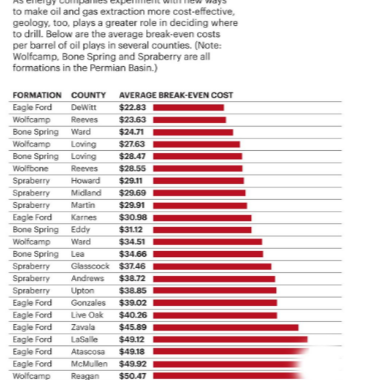
What The Failed Halliburton-Baker Hughes Deal Means For The Oil Service Industry
One of the biggest proposed mergers in the oil industry in recent years, the $35 billion deal between the two oil service giants Halliburton and Baker-Hughes, has been abandoned in response to opposition from the U.S. Department of Justice. Halliburton will pay a $3.5 billion penalty for the deal’s cancellation, while Baker-Hughes has noted losses related to the deal of about $500 million. Yet the stock price of both companies rose on the announcement that the merger was being abandoned.
The straightforward explanation is that investors felt the deal was unlikely to go through, or would not yield favorable results if it did. Which raises the question of what they knew (or believed) that the two companies’ executives did not? Most likely, they expected the deal would not be approved, as the Justice Department looked askance at the potential combination of the second and third largest oil field services companies and its impact on competition. Since less competition and higher prices would undoubtedly be one of the benefits from the merger, the Justice Department’s concerns were a clear signal that even if allowed, the conditions, including spinning off large units, would be onerous enough to prevent those gains. The strong opposition from the oil industry obviously reinforced the government’s interpretation.
The other possibility is that investors did not believe the cost savings would meet projections. Halliburton expected to be able to save $2 billion annually, or about 4% of revenue, but given the two companies size, it seems unlikely that gains from economies of scale would be widespread. No doubt there are places were combining back-office services could result in some savings, but again, these are not small firms with underemployed HR people who could accept a doubled case load. Selling off redundant rigs would simply mean creating low-cost assets available for competitors, and reducing workforce (and equipment) does not require a merger to accomplish.
Given the history of megamergers, which are usually driven by optimism about “synergy” and cost savings, the market was naturally skeptical about the benefits in this case. Study after study has shown that most mergers do not generate the expected benefits, and there is not much reason to think this one would have been different.
The two companies were not suffering from being too small, but from the inflation that crept into their operations and costs during the boom years; a merger is hardly the best way to solve that. Indeed, the prospective merger put most cost-cutting on hold, a typical downside to mergers that is often overlooked or underestimated. Wall Street seems to feel that the combination of operational confusion before, during and after the merger, and lower than expected returns from economies of scale, would translate into a typical case of overreach and the resultant subpar financial outcome. Arguably, the merger effort represented executives desire to make a grand statement and/or hubris about their ability to sway the Justice Department to approve the deal, but that judgement awaits more analysis than can be done now.
The message to the service industry generally is that cost control is going to be their obsession for the near-term future. Higher oil prices would bail many out, but thinking that they will rise significantly above $50 in the next few years is naïve. Yes, war and revolution could send prices soaring, but a business strategy that relies on such is foolish.
With two of the three service industry giants now committed to layoffs and other cost reductions, the rest of the industry will be under pressure to respond accordingly (if they haven’t already done so). Laid off skilled workers will depress wages in the sector and the prices for equipment rentals (deepwater rigs, for example) should remain depressed. Offshore rig utilization is about 50%, down from 80% two years ago, while estimated capital expenditures for offshore are down about 25% in the same period. The value of many rigs will probably be written down and deep discounting will allow them to find work, but ultimately, the path forward will be long and painful.



